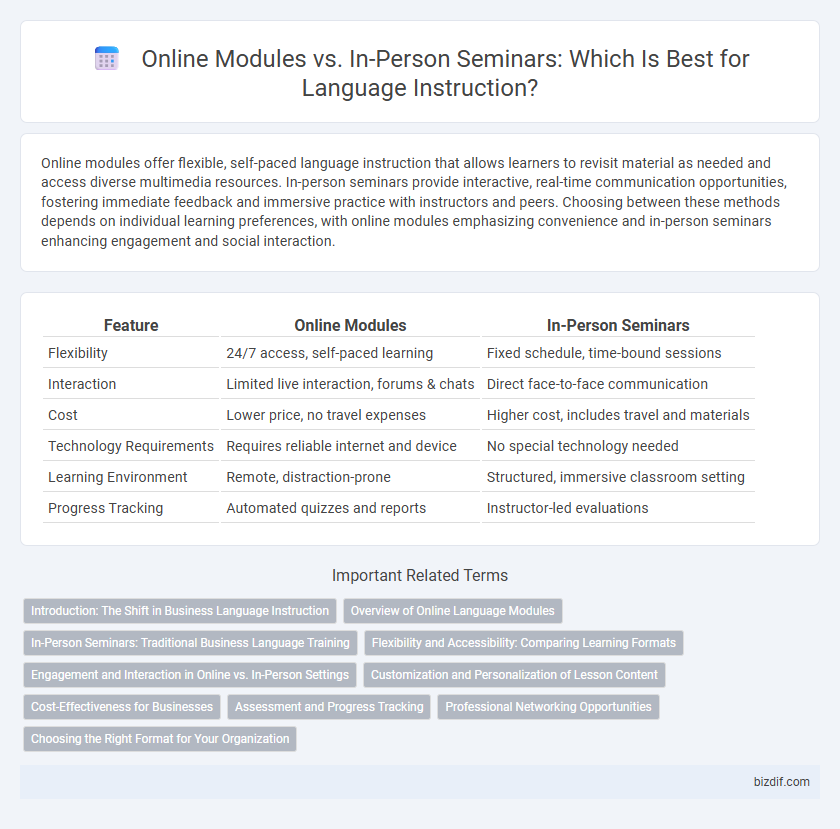Online modules offer flexible, self-paced language instruction that allows learners to revisit material as needed and access diverse multimedia resources. In-person seminars provide interactive, real-time communication opportunities, fostering immediate feedback and immersive practice with instructors and peers. Choosing between these methods depends on individual learning preferences, with online modules emphasizing convenience and in-person seminars enhancing engagement and social interaction.
Table of Comparison
| Feature | Online Modules | In-Person Seminars |
|---|---|---|
| Flexibility | 24/7 access, self-paced learning | Fixed schedule, time-bound sessions |
| Interaction | Limited live interaction, forums & chats | Direct face-to-face communication |
| Cost | Lower price, no travel expenses | Higher cost, includes travel and materials |
| Technology Requirements | Requires reliable internet and device | No special technology needed |
| Learning Environment | Remote, distraction-prone | Structured, immersive classroom setting |
| Progress Tracking | Automated quizzes and reports | Instructor-led evaluations |
Introduction: The Shift in Business Language Instruction
The shift in business language instruction reflects a growing preference for online modules due to their flexibility and accessibility compared to traditional in-person seminars. Corporate learners benefit from digital platforms offering interactive exercises, real-time feedback, and personalized pacing, enhancing overall engagement. Despite this trend, in-person seminars retain value for immersive communication practice and networking opportunities within professional settings.
Overview of Online Language Modules
Online language modules offer flexible, self-paced learning environments with interactive multimedia content, enabling learners to access lessons anytime and anywhere. These modules often include AI-driven assessments and personalized feedback to enhance language acquisition efficiency. Accessibility and scalability make online modules ideal for diverse learners seeking convenient and cost-effective language instruction.
In-Person Seminars: Traditional Business Language Training
In-person seminars for business language training provide immersive interaction that enhances real-time communication skills and cultural understanding. These sessions typically offer personalized feedback and dynamic role-playing exercises, fostering practical language application in professional settings. The structured environment of traditional seminars supports consistent motivation and accountability, which are critical for mastering business-specific terminology and etiquette.
Flexibility and Accessibility: Comparing Learning Formats
Online modules offer unparalleled flexibility and accessibility, allowing learners to access materials anytime and from any location, accommodating diverse schedules and learning paces. In-person seminars provide structured environments that enhance engagement and immediate interaction but often require fixed times and physical presence, limiting accessibility for remote participants. The choice between formats depends on individual needs for flexibility against the benefits of direct, real-time communication.
Engagement and Interaction in Online vs. In-Person Settings
Online modules offer flexible, self-paced learning but often lack real-time interaction, reducing opportunities for spontaneous questions and peer discussion. In-person seminars foster higher engagement through immediate feedback, group activities, and face-to-face communication, enhancing language acquisition and retention. Interactive tools like live polls and breakout rooms in online settings attempt to replicate this dynamic but frequently fall short of the immersive experience provided by physical classrooms.
Customization and Personalization of Lesson Content
Online modules offer high customization through adaptive learning technologies that tailor lesson content to individual progress and preferences, enhancing learner engagement. In-person seminars enable personalized interaction with instructors who can adjust lessons in real-time based on immediate feedback and participant needs. Combining these approaches maximizes customization and personalization by leveraging digital flexibility alongside human responsiveness in language instruction.
Cost-Effectiveness for Businesses
Online language instruction modules reduce costs for businesses by eliminating expenses related to travel, venue rental, and printed materials, making them a budget-friendly alternative to in-person seminars. These digital platforms offer scalable learning paths and flexible scheduling, which maximize employee participation without disrupting daily operations. In contrast, in-person seminars often involve higher upfront costs but can provide personalized interaction that may enhance engagement and retention for some learners.
Assessment and Progress Tracking
Online modules provide automated assessment tools with instant feedback, enabling real-time progress tracking through digital dashboards. In-person seminars rely on instructor-led evaluations and personalized feedback, often resulting in more nuanced understanding but slower progress monitoring. Combining both methods can optimize assessment accuracy and enhance learner engagement by balancing immediate data with personalized insights.
Professional Networking Opportunities
Online language instruction modules offer limited professional networking opportunities compared to in-person seminars, which facilitate direct interaction and relationship-building among participants. In-person seminars enable spontaneous conversations, group activities, and real-time feedback, fostering stronger connections within language learning communities. Professional networking in physical settings often leads to collaboration, mentorship, and job opportunities that are harder to achieve through online platforms.
Choosing the Right Format for Your Organization
Online modules offer flexible, scalable language instruction ideal for organizations seeking cost-effective training accessible anytime and anywhere, supporting diverse learning paces. In-person seminars deliver immersive, interactive experiences that foster immediate feedback and stronger interpersonal communication skills, crucial for teams requiring intensive practice and cultural nuance. Evaluating organizational goals, budget constraints, and learner preferences guides the optimal choice between virtual convenience and face-to-face engagement in language education.
Online modules vs In-person seminars Infographic

 bizdif.com
bizdif.com